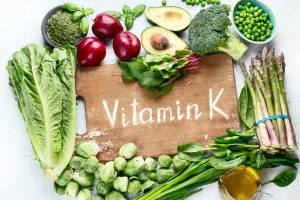
Vitamin K is an essential vitamin and plays an important role in maintaining good health by helping blood to clot. It helps to prevent heavy bleeding, among other things. A sufficient vitamin K level is also important for babies in order not to suffer from a deficiency.
The Importance of Vitamin K
The two naturally occurring forms of vitamin K are K1 and K2. The liver needs vitamin K1 for the formation of various coagulation factors that enable the blood to clot well. In addition to improving healthy blood flow and clotting, this vitamin also regulates blood calcium levels, prevents buildup in blood vessels and protects against bone diseases such as osteoporosis. The body needs vitamin K to synthesize proteins in the plasma, bones and kidneys.
Although exact daily requirements are not known, it is generally recommended that adult males should consume around 70ug and females 60ug. This also applies to pregnant women and nursing mothers. Foods rich in vitamin K include vegetables such as broccoki, spinach, and kale. Dairy products, meat, fruit and eggs also provide this important vitamin.
Vitamin K and Your Pregnancy Diet
For most women, getting all the required vitamin K should be easy through a healthy, balanced diet during pregnancy. There is no increased need for vitamin K when you are expecting a baby. Most of the vitamin K your body needs is made by the bacteria in your gut and the rest is obtained from your diet. Only in special cases it may be advisable for expectant mothers to include a vitamin K supplement in their prenatal vitamin regimen.
Certain medical conditions, such as cystic fibrosis, celiac disease or Crohn’s disease, where adequate vitamin K absorption is impaired, require vitamin K supplementation, particularly in the form of a multivitamin containing vitamin K, which is considered more beneficial than vitamin K alone. Supplementation can also be useful when taking antibiotics that inhibit vitamin K absorption by destroying vitamin K-producing bacteria and bacteria harmful to the body.
Why do Babies Need Vitamin K?
Vitamin K helps the baby’s blood to clot and prevents heavy bleeding. Babies do not naturally get enough vitamin K from their mother during pregnancy. Breast milk usually does not provide the child with enough vitamin K. This can lead to a vitamin K deficiency in newborns. If your baby is vitamin K deficient, they are at risk of developing a condition called vitamin K deficiency bleeding, or VKDB. This disease is known internationally as VKDB (for “vitamin K deficiency bleeding”). Although VKDB is rare, the condition can cause babies to bleed excessively, especially from the brain area. This condition can cause brain damage and even death. Bleeding occurs due to decreased levels of prothrombin — an important element of the blood that depends on vitamin K for clotting — which slows the blood clotting process and can lead to excessive maternal or neonatal bleeding.
These children also bruise spontaneously. Late vitamin K deficiency bleeding (weeks after birth) mostly affects breastfeeding babies with health disorders such as liver diseases. These make it difficult for the body to absorb vitamin K. In order to avoid vitamin K deficiency bleeding after delivery, it is important that the babies receive an extra dose of vitamin K. The vitamin can be administered either orally in the form of drops or as an injection. Drops are administered in three doses, the syringe once, whereby the effectiveness of both methods is given equally. There are certain cases where it is important for the baby to get extra vitamin K after birth: this applies not only to children with liver problems, but also to premature babies, babies born using a ventouse or cesarean section who have breathing problems have or were injured during childbirth. Many parents wonder if their child really needs vitamin K after birth. It is best to talk to your doctor for detailed advice.



